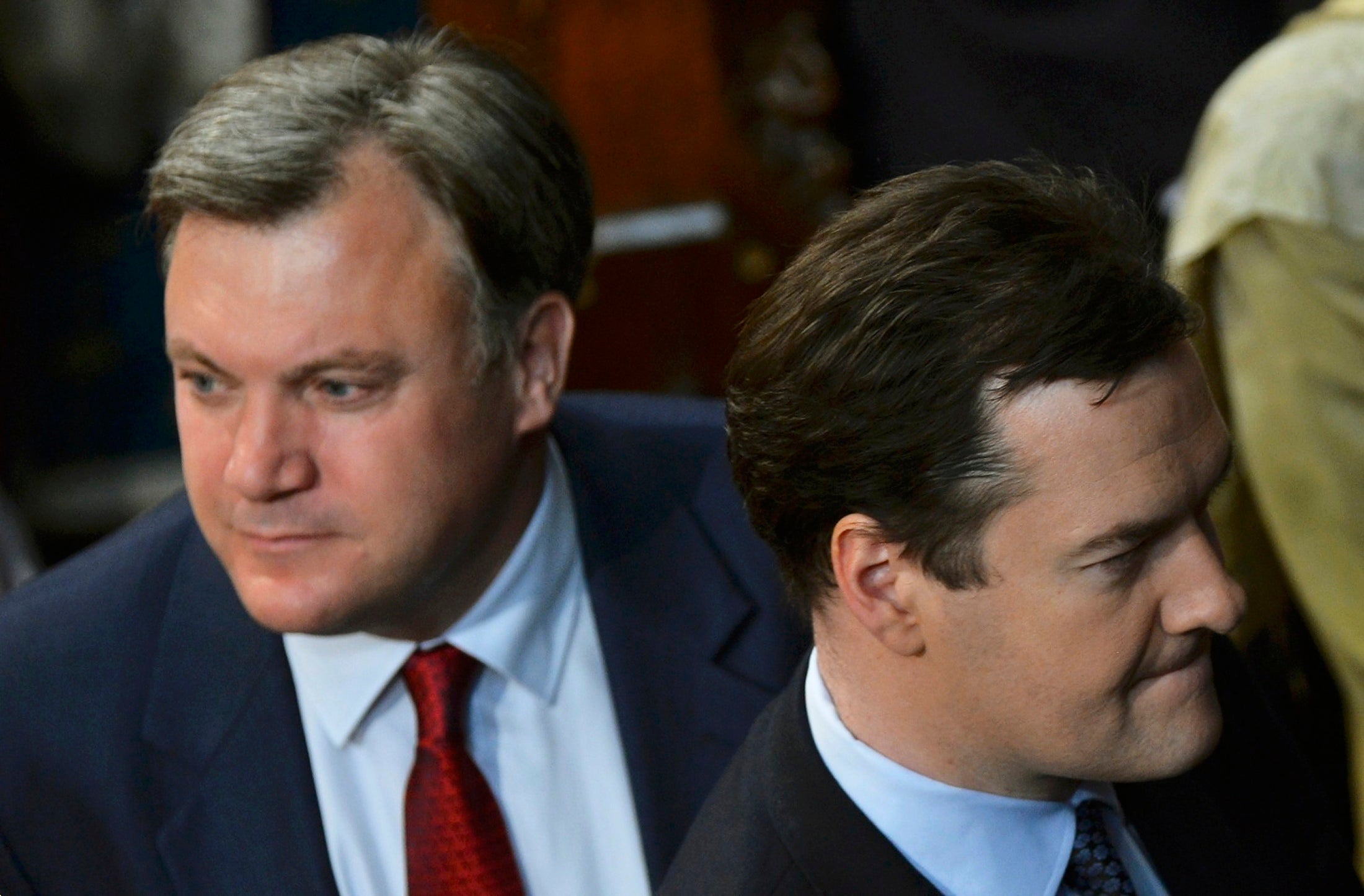It’s the Balls and Osborne show. Talk about plunging interest rates...
The ‘Political Currency’ podcast stars an actual chancellor and shadow chancellor, writes Tom Peck. Fireworks must surely follow. But it’s about as explosive as the history of the triple lock...


If you’re only going to listen to one pair of middle-aged men talking about politics for about 45 minutes a week, then there’s every chance you might go with Ed Balls and George Osborne.
It’s a double act that’s already been a bit of a media success story, most notably on election night 2017, when Osborne failed to conceal his delight at the demise of his own party, and in so doing almost single-handedly won ITV an RTS award.
These, after all, are two political heavyweights. They’re not political correspondents. They’re also not, at least in my humble opinion, what you would necessarily call “centrists”. What should set their new podcast, Political Currency, apart is real expertise, gained by real-life experience of sitting in the big boy’s chair.
Alastair Campbell and Rory Stewart might both be loquacious and likeable, but one was a minor cabinet minister, and the other, however powerful he might have been, was a political journalist turned adviser. Campbell has never run for office in his life, and is best understood these days as an anti-Tory activist.
A chancellor and shadow chancellor, and both people of real and lasting consequence, should be able to see politics from a different angle to the rest of us – that angle being not what they think, but what they would do. To illuminate the intense pressure of having not merely to hold an opinion, but to make a decision.
And yet, at no moment in the first edition of Political Currency, which is now available, does the conversation appear to deviate from the now very-well-known format of two middle-aged blokes shooting the breeze about whatever happens to be going on at the moment.
The first 15 minutes of the programme is spent discussing the “Chinese spy in parliament” revelations. Balls reckons it was “clever” of this alleged spy to get involved in the “China Research Group” – which is actually anti-China, but that’s how you’re going to find out what the anti-China lot really think. Osborne points out that “he wasn’t that clever because he got caught!”
Neither manages to make the crucial point on the subject, which is that what this alleged spy is alleged to have done is to use Westminster to gain the confidence of Chinese dissidents seeking help from UK politicians and then betray them to his Chinese paymasters. Osborne, meanwhile, elects not to mention the “Golden Age” of China-UK relations, of which he was the key architect, and David Cameron taking Xi Jinping for a pint in a Cotswolds pub. All of which now appears to have been quite a grave error.
Later, on the subject of the triple lock on pensions, each of them is very happy to elaborate on his own personal role in the creation of the triple lock. What Balls did via Gordon Brown in 1999, how Osborne acquiesced to Lib Dem demands in 2010 and introduced it. But what about the actual questions that matter? Is the triple lock a good idea? Can we afford it? Is it, in fact, not in millennials’ interests to get angry about it because they’ll be pensioners, too, in the end? Could it be that they might need an index-linked state pension more than anyone?
None of this is discussed in any meaningful way. Instead, both men chat about whether it’s politically wise to make veiled threats to pensioners before an election. Everybody knows the answer to that question. That’s the sort of extremely obvious point you expect to hear waffled out by some political correspondent, roped into doing their newspaper’s weekly podcast, and the whole point of these two is that they’re meant to be better.
The two men’s intellectual insights are instead put to good use in discussing the enjoyably cynical art of using such things to set “political traps”. The fact that, according to Osborne, the Conservatives threatening to break the link between rising benefits and rising wages actually makes life harder for Labour, because they’ll have to say where they’re going to get the money from if they plan to start giving away all these benefits again at the expense of working people.
If this is to be the tone for the weeks and months ahead, it seems hard to imagine Political Currency becoming essential listening.
On the one hand, who did what and why between 2000 and 2016 becomes less interesting with every passing day. And on the other, talking up the big political questions like the pensions triple lock, and then reducing them to how they can and will be used for cynical political electioneering, is the kind of thing that’s driving people away from traditional news reporting and towards political podcasts like these in the first place.





Join our commenting forum
Join thought-provoking conversations, follow other Independent readers and see their replies
Comments